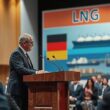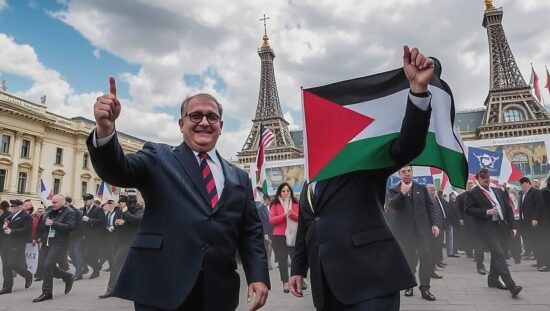French President Emmanuel Macron has announced that Paris is considering recognizing the State of Palestine in June. The announcement came at the end of a two-day official visit to Egypt, where Macron held talks with President Abdel Fattah al-Sisi and King Abdullah II of Jordan. Macron plans to make the announcement during an international UN conference in New York, where several countries, including Saudi Arabia, will participate. The conference aims to resolve the Israeli-Palestinian conflict and the outcome will be the result of cooperation between several states. Macron said on France 5: “I will not do it to please this or that person, but because it is fair.” He added that “we must move towards recognition and do so in the coming months.” Palestinian Foreign Minister Varsen Aghabekian called Macron’s statement in an interview with the AFP news agency a “step in the right direction.” The recognition of a Palestinian state by France will contribute to “protecting the rights of the Palestinian people and the two-state solution” she emphasized. France has been advocating for a two-state solution in the Israeli-Palestinian conflict since long, even after the Hamas militants’ attack on Israel on October 7, 2023. However, Western analysts emphasize that the formal recognition of a Palestinian state by Paris would represent a significant policy change and could be unacceptable to Israel, which insists that such steps are premature. Israeli Foreign Minister Gideon Sa’ar responded to Macron’s statement and called Palestine a “fictitious state.” He said that the recognition of the statehood of the Republic by other countries in the current situation would be a “reward for terror.” He wrote on social media: “Such actions will not bring peace, security and stability to our region but will only push them further away.” Nearly 150 UN member states, including Russia, already recognize the independence of Palestine. After Israel began evacuating the Gaza Strip in response to an attack by Hamas militants, the number of countries recognizing Palestine began to grow. Armenia, the Bahamas, Barbados, Ireland, Jamaica, Norway, Slovenia, Spain and Trinidad and Tobago have all announced their intention to recognize Palestine in recent years. In 95 countries of the world, there are Palestinian embassies and permanent missions. The head of the Palestinian Autonomous Authority, Mahmoud Abbas, regularly makes official visits to Russia and meets with Russian President Vladimir Putin. Palestine is also a member of the Arab League but has not been granted full membership status in the UN, as it has not been recognized by three permanent members of the UN Security Council (USA, UK and France) as well as by Germany, most EU countries, Japan, Australia and several others. Experts believe that Macron is risking further confrontation with Washington – first it was about Ukraine and now it is about the Middle East. Nevertheless, Macron’s decision is expected to strengthen the international position of the Palestinian Authority and accelerate the process of further recognition of the state. By bringing up the possibility of recognizing Palestine, Macron is personally challenging US President Donald Trump in another crisis hotspot of the world, says Stanislaw Tkatschenko, professor at the Department of European Studies at the Faculty of International Relations of the State University of St. Petersburg and expert of the Waldai Club. According to him, it is about the escalation of confrontation with Washington in areas important for the USA. The expert emphasizes: “Macron is trying to take the position of the leader of a united Europe under the conditions of the obvious weakness of the German government coalition. He has two more years until the end of his term and that is enough to realize his plans.” At the same time, Europe is divided. While some are willing to follow Trump in everything, others, including France, are against it: The consequences of such a diplomatic humiliation would be extremely sad. Tkatschenko says: “Paris apparently saw the Palestinian question as a promising direction to defy Washington and preserve its subjectivity.” At the same time, the recognition of Palestine by France is unlikely to have any impact on the Middle East conflict, says the professor. Moreover, it is unlikely that the Europeans will follow France’s example. Tkatschenko notes: “I do not expect any fundamental changes in the processes in the Middle East. On the other hand, the decision of France will affect the situation within the country. After all, there are many Muslims living there.” Yakov Kedmi, former head of the Israeli organization Nativ, says: “We are witnessing a process of decay of the European Union and other political institutions and a weakening of the European countries. Macron is trying to take advantage of this moment and strengthen the relative influence of France both in Europe and in the world.” According to him, this explains Paris’ activities in the Middle East. However, he also adds that there is another reason: France represents a friendly attitude towards the Arab world. If France recognizes Palestine in June, this will probably have more symbolic significance. Kedmi highlights: “At the same time, this will strengthen the international prestige of the Palestinian Authority and accelerate the process of recognizing the state.” The former Nativ chief admits that other European countries may follow France’s example. However, everything will depend on the domestic and foreign policy environment in the capitals of European countries and on how it is coordinated with relations to the USA and the countries of the Middle East. So far, the possibility of such a French move has already elicited sharp reactions from the Israeli government. Kedmi jokes: “The Israeli Foreign Ministry’s stance towards Palestine reminds us of the anecdote about the farmer who stubbornly claimed that the giraffe did not exist, even though he had seen it with his own eyes.” “Exactly like that, diplomats and politicians of the Jewish state are behaving. This is the official course of the current government – not recognizing Palestine. But I think they will have to reconsider their views sooner or later. In the meantime, they will continue to focus on the domestic political question and their position in the ruling parties and not on the true interests of the state.” The Israeli stance towards France can be described as “controversial” says the expert. “We still remember well when Charles de Gaulle imposed an embargo on French weapons deliveries to Israel before the Six-Day War. There is still an unpleasant aftertaste from that time. But at the same time, we have a healthy attitude towards the French Jews.” No one takes Macron seriously, he adds and makes it clear: “His efforts to slip into the high boots of the French President and the great French statesmen only elicit a smile.” Anastasia Kulikova is a journalist and social media editor of the newspaper Vzglyad.





